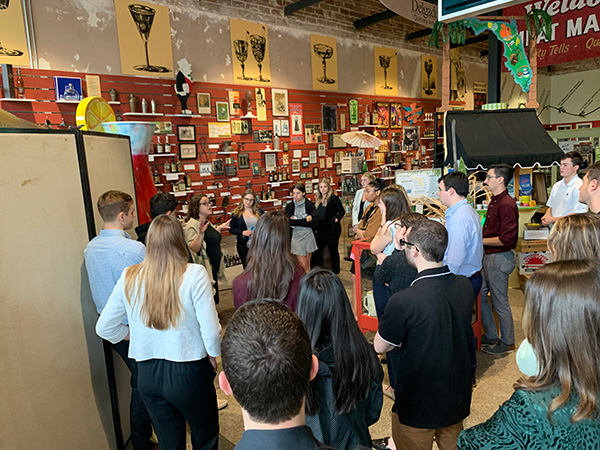
Jennie Merrill, center, director of education and outreach at the Southern Food and Beverage Museum, gives a tour to students during January’s Entrepreneurial Hospitality Seminar.
By A. J. Brooks
When Associate Dean John Clarke told me that Freeman had identified hospitality entrepreneurship as an emerging opportunity area for the school, I got very excited. I distinctly remember his pitch — “creating competitive advantage through customer experience” — and while that tidy summation is still accurate, the more practical question for me was, “What does a specialization in Entrepreneurial Hospitality actually look like?” Suffice to say, it took us some time to answer that one, particularly after we decided to add “online” to the discussion. Over the last year, however, what has emerged from those discussions is a simple yet highly relevant program built on three core pillars: innovation, sound business fundamentals and customer-centricity.
So what does Freeman’s take on hospitality education look like? First, when we surveyed other hospitality programs in the marketplace, we found that the majority of them were laser focused on the traditional hospitality sectors — lodging, food and beverage, travel and tourism, recreation — and understandably so. Those sectors, combined with the ancillary businesses that support them, make up the world’s largest industry. For our program, however, we opted to take a broader view of hospitality. One of my favorite lines to use at our information sessions is, “Any company that actively competes for clients or customers is, or at least should be, in the business of hospitality.” In our definition, hospitality reaches far beyond the ability to deliver excellent customer service. It’s a function of a firm’s ability to effectively engage with its customers. To paraphrase Danny Meyer, “Service is a monologue whereas hospitality is a dialogue.” This principle is one of many that can be applied not just to hotels and restaurants but to organizations across all industries.
The program’s second distinctive feature is its underlying pedagogical method. Business schools traditionally take a “managerial” approach toward educating students: They provide them with the tools and skillsets to be able to execute a known business model. By contrast, we offer a unique “entrepreneurial” method whereby our students leave the program with the ability to tackle both known and unknown business models and to do so in a complex and highly uncertain environment.
Our third differentiator is the capstone project. This is the means by which we give students the ability to truly customize their education and explore those areas in which they’re most interested. Under the guidance of Freeman School faculty, industry professionals and the staff of the Lepage Center for Entrepreneurship and Innovation, Entrepreneurial Hospitality students will conceptualize, market-test and create an investment-ready business plan for presentation at the program’s end. The project is introduced on day one in my introductory Entrepreneurial Hospitality course and is then developed over time through a sequence of interrelated courses, each building out different components of the final plan. The capstone project gives the
student a common and consistent thread throughout the program which in turn provides greater context and a mandate for personal reliance and self-discovery.
In our courses we are using insights from many of the exceptional hospitality companies in our city and region, from world-class hotels and restaurants to innovators in retail and health care, but the curriculum is more than the sum of its parts. We aim to bring to life the intersecting worlds of entrepreneurship and hospitality and push students to find creative business solutions within one of the greatest periods of disruption in modern history. Our core pillars — innovation, sound business fundamentals and customer-centricity — will enable students to develop a market-relevant professional skillset, brought to life through our action learning curriculum and award-winning faculty.
As we continue to build our inaugural cohort, I’m more excited than ever and looking forward to working with these outstanding students to launch a new era of business education at the Freeman School.
A. J. Brooks (MBA ’12) is a lecturer in finance and assistant director of the Greenbaum Family Program in Entrepreneurial Hospitality. Prior to joining the Freeman School, Brooks was actively engaged in New Orleans’ startup hospitality scene as both a consultant and owner. His work includes the Selina Catahoula Hotel, Simone’s Market, Belladonna Day Spa and Mahony’s Po-Boys.

